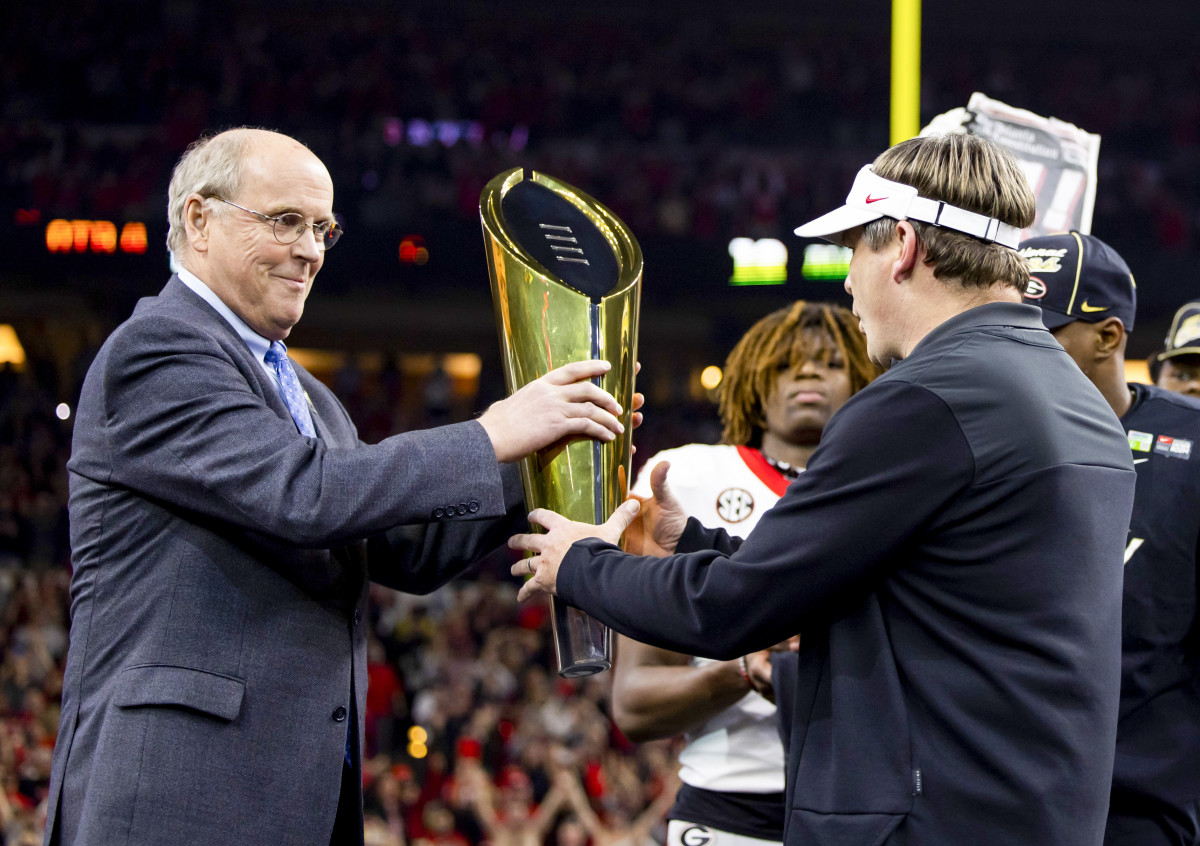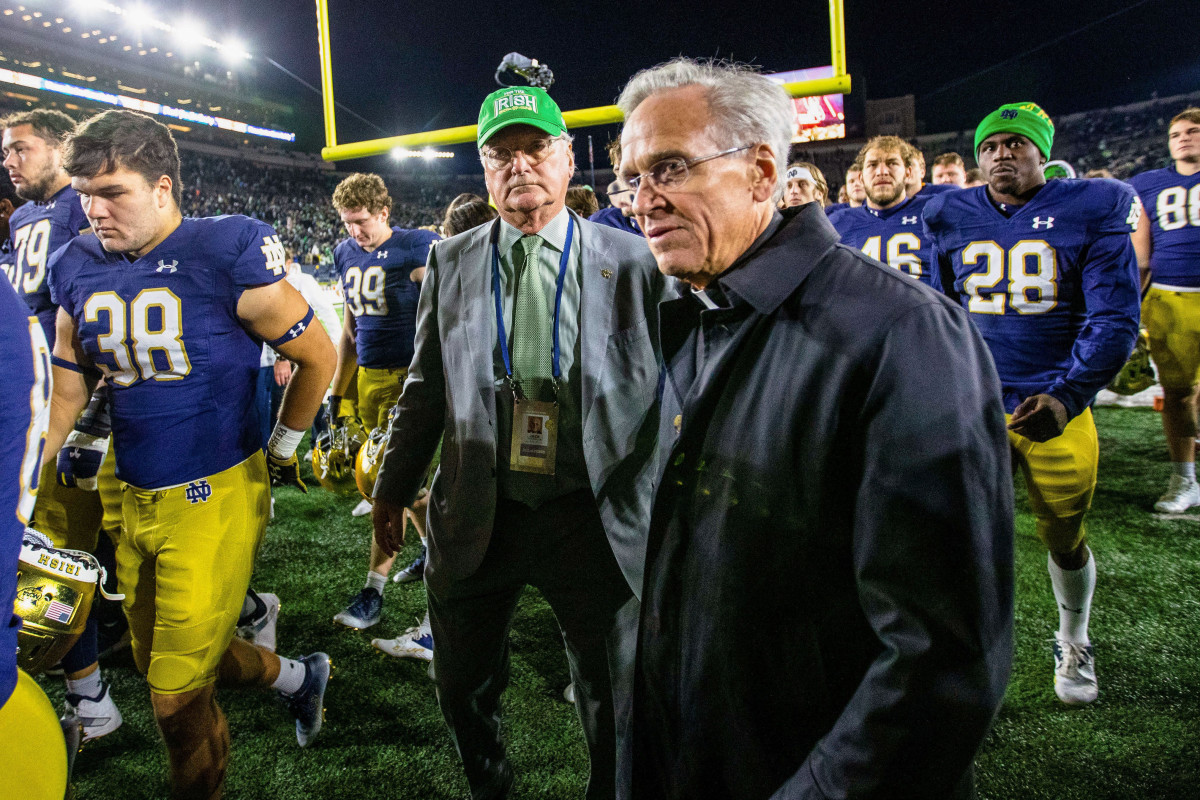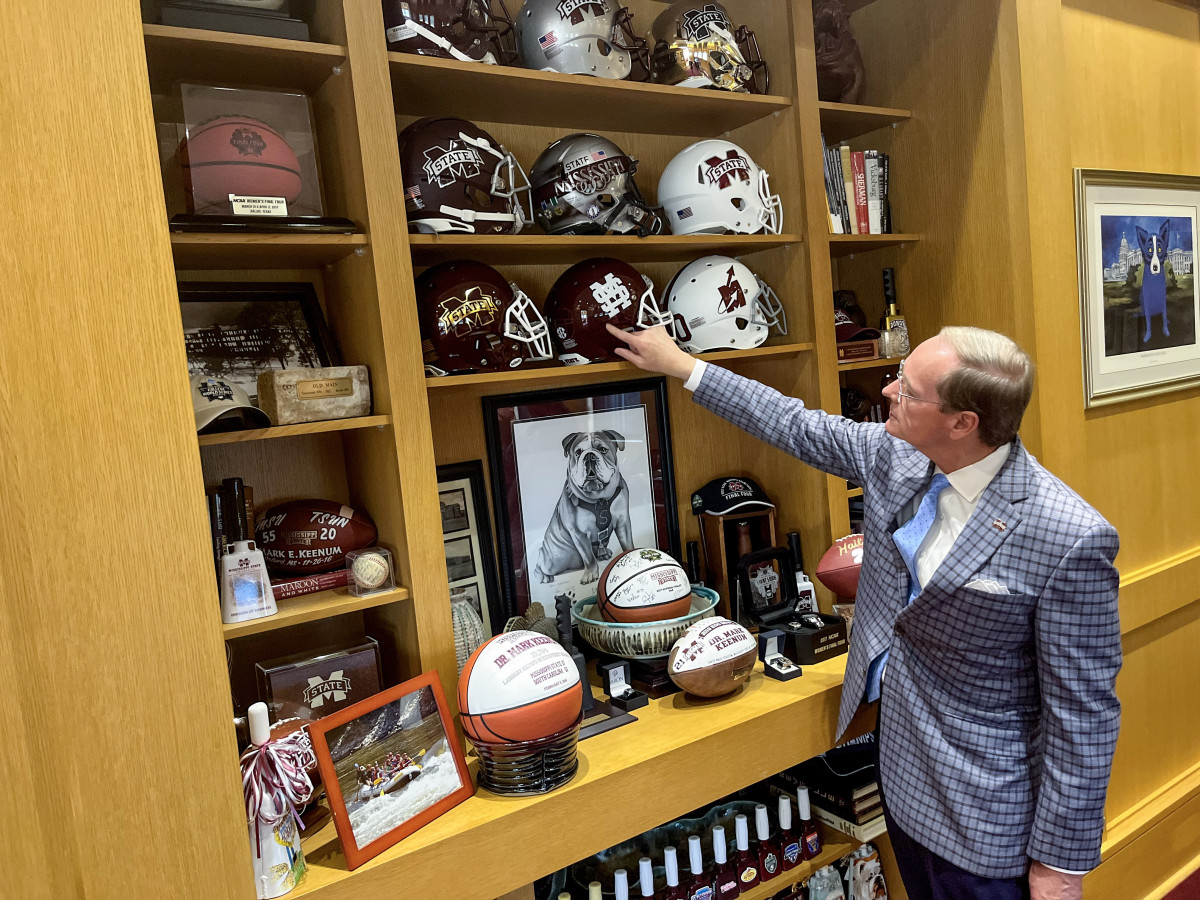Behind the Scenes, and Closed Doors, That Led to College Football Playoff Expansion

This all started with a cowbell.
If you don’t believe it, Mississippi State University president Mark Keenum will walk to his wall of memorabilia and show you the cowbell his daddy gave him in 1973. About 14 inches in length, the maroon-painted metal noisemaker shows its age, scuffed and scarred from years of furious clanging, the metallic handle chipped and the faded white sticker on its exterior barely legible. “I’m from Bulldog country,” it reads.
He doesn’t necessarily look like your normal Southern college football fan. Dressed in a blue plaid suit, black pants and loafers, a white handkerchief peeking from his breast pocket, his hair perfectly manicured and face clean-shaven, Keenum stares through thin-rimmed glasses looking as dapper and tidy as his surroundings. His fourth-floor university office is a lavish labyrinth of a half dozen rooms—including a hidden meeting space, a marbled foyer, a mahogany-themed boardroom, all set on a maroon-carpeted canvas surrounded by white crown-molded walls.
The layout is reminiscent of a place he knows quite well: the White House.
Keenum spent roughly two decades in Washington, D.C., while on the staff of then Senator Thad Cochran (R., Miss.), elevating from legislative assistant to chief of staff. Keenum’s wife, Rhonda, is a political consultant who served under the administration of President George W. Bush. They were known as one of the city’s political power couples: gentle and quiet Mark, silently pulling political strings; lively and sociable Rhonda, smoothly operating in public engagement.

Aside from framed photos of him posing with a range of political figures—Bush, President Bill Clinton, former California governor Arnold Schwarzenegger—Mark Keenum’s office is bathed in Mississippi State sports. He has a section of one room devoted to the Bulldogs baseball team—championship rings, team photos, signed baseballs and monogrammed hats. Resting atop a nearby table is the trophy the Bulldogs received for winning the 2021 College World Series.
He has six variations of Mississippi State football helmets, a signed basketball encased in glass, a handful of bowl watches, several commemorative footballs and, yes, a lot of cowbells. Keenum has no fewer than 45 different ones in his office, some as big as frying pans and others as small as iPhones. In one of his proudest accomplishments, Keenum delivered an elaborate presentation in 2010 that convinced his fellow SEC presidents to stop a vote to ban cowbells from stadiums. They instead instituted a policy, still active today, that allows the bells to be rung only while the opponent’s offense isn’t at the line of scrimmage.
“As an outsider, you’d think this is odd,” he says, holding that original cowbell of his. “But when you are a part of it, it is important to you. It is a tradition. We all have our traditions.”
Nearly 50 years after Charles Keenum gifted his 12-year-old son that cowbell, Mark, a Mississippi boy born in Starkville and raised in the 14,000-person town of Corinth, once a 230-pound center who played junior college football, captained one of the most significant changes in college football history.
As chairman of the College Football Playoff’s top board of executives, Keenum steered the Playoff expansion conversation this past summer before presiding over two secret fall meetings this fall and insisted during their last gathering Sept. 2 that his fellow presidents vote to change the course of the postseason from a four-team to a 12-team Playoff field.
With at least one conference arguing to delay a vote, Keenum bellowed a message across the Zoom call: “No, no, no. We are voting today. This is a vote day. You can vote ‘No,’ but we are voting. And the vote will be public.”
Keenum ended more than a year of squabbling among conference commissioners. No more stalling or delaying. No more excuses to not engage or reasons not to act.
“There would be no possibility to expand in 2024 or ’25 if Mark didn’t take it on,” says SMU president R. Gerald Turner, the American Athletic Conference’s presidential representative on the CFP executive board. “He could have sat in Starkville and let it die. He didn’t.”
Conference commissioners will meet in person in Dallas on Thursday for a third time since the presidents delivered their edict. While they approved the expanded Playoff to start no later than 2026, the presidents tasked commissioners to explore the possibility of starting it as early as ’24. College football’s rabid fan base isn’t the only group fiercely in support of expanding as early as possible. The presidents are, too.
“If it was just up to the 11 presidents, we would get it done,” Turner says. “There’s no reason that I can see not to do it. You can’t have some local logistic issue or a bowl game not liking it [prevent] it from being implemented in 2024.”
During his interview with Sports Illustrated, Keenum expressed confidence in the Playoff expanding by 2024 and suggested the same in a recent call with SEC presidents. “He thinks they will get it done,” says one person on the call who requested anonymity.
Whenever it happens, expanding to 12 teams will be a celebrated moment. An expanded Playoff in 2024 and ’25 generates a combined 16 additional Playoff spots, as well as the financial component (about $450 million in additional television revenue distributed to all FBS schools).
SI spoke to various stakeholders as well as more than half of the 11 presidents who make up the CFP Board of Managers, the group that assumed control of the expansion issue and aggressively adopted the new Playoff. They describe a fascinating tale of secret meetings; a game-changing legal document delivered two weeks before the vote; a last-minute attempt to delay the process; and a man from Mississippi, of all places, responsible for forcing the change.
“Without Mark’s leadership,” AAC commissioner Mike Aresco says, “I don’t know that it happens.”

Mark Keenum speaks slowly and calmly, in almost hushed tones, with a thick Southern drawl. In an appropriate comparison for these parts, his words are like melting butter.
“He’s got this old country gentleman persona, but he can be an assassin,” says one college administrator who requested anonymity.
In 2015, former SEC commissioner Mike Slive appointed Keenum to be the league’s representative on the CFP Board of Managers, the Playoff’s executive group of presidents. Three years later, board members elevated him to chair, one of the most powerful positions in college athletics. While being the CFP’s top governing body, the Board of Managers acts somewhat as a rubber-stamping mechanism, often taking cues from its subordinate legislative group, the Management Committee, encompassing the 10 FBS conference commissioners, and independent Notre Dame’s athletic director Jack Swarbrick.
However, when it came to Playoff expansion, the presidents gave the original orders. According to multiple people interviewed by SI, then-Penn State president Eric Barron, the Big Ten representative on the Board at the time; and Texas president Gregory L. Fenves, of the Big 12, argued most for expansion. In a January 2019 meeting in San Jose, Calif., hours ahead of Clemson’s eventual win against Alabama and a year after an all-SEC showdown between Alabama and Georgia, the Board directed CFP executive director Bill Hancock to form a subcommittee of commissioners to explore expansion models. The four-person subcommittee—Greg Sankey (SEC), Bob Bowlsby (Big 12), Craig Thompson (Mountain West) and Swarbrick—introduced their 12-team plan in June ’21.
Just as commissioners were set to examine and likely eventually adopt the model, news emerged in mid-July that the SEC was acquiring Oklahoma and Texas, a groundbreaking realignment move that fractured the room of commissioners. The three newest league leaders—Kevin Warren (Big Ten), Jim Phillips (ACC) and George Kliavkoff (Pac-12)—even formed a pact it termed the Alliance.
If there’s any question as to what started the delay in expansion negotiations, they can finally be put to rest. While giving an update on Playoff talks to SEC presidents last year, Keenum told the group the SEC realignment news was the “disruption,” says Kentucky president Eli Capilouto.
“Everybody was pretty much on board and then the move of Oklahoma and Texas to the SEC occurred and caused mistrust,” says Notre Dame president John Jenkins, a member of the CFP Board. “That undermined the conversation.”
In February, after five months of squabbling with one another and in meetings that at times turned into intense debate and petty bickering, commissioners failed to agree on an expanded Playoff. The unofficial vote, 8–3, needed to be unanimous to implement before the current CFP contract with broadcast rights-holder ESPN expires (it runs through 2025).
The three dissenters: the Big Ten, ACC and Pac-12.

Bob Bowlsby, in his last CFP meeting as Big 12 commissioner back in late June in Park City, Utah, was exhausted from the yearlong expansion negotiations. Angered by the monotonous discussion, he rose from his seat, glanced at his 10 counterparts and said, “This is bulls---!”
“I think I said that, increasingly, people outside the enterprise are controlling our activities inside and we need to reclaim the leadership role and manage the things we can manage,” recalls Bowlsby, now retired.
Commissioners began to make progress on key expansion issues. Some of the reasons first used to delay negotiations were suddenly gone. The Pac-12 overcame its issues with the revenue distribution model, and the Big Ten softened its position on having Power 5 champions receive automatic qualifying spots. The ACC, requesting a full review of the football calendar before expanding the Playoff, seemed satisfied with its progress.
“Candidly,” Sankey says, “I was surprised people had so rapidly pivoted.”
Multiple officials with knowledge of the talks say three more events, all involving the Big Ten, contributed to expansion support: (1) the league’s acquisition of USC and UCLA torpedoed the Alliance; (2) the conference finalized its multibillion-dollar television deal; and (3) Ohio State president Kristina Johnson replaced Barron as the Big Ten’s representative on the CFP Board.
“Obviously, the SEC and Big Ten are the most influential movers and shakers,” SMU president Turner says. “You really need the two of them to be aligned. It took a while to work it out.”
Keenum and the university presidents, meanwhile, held private conversations amongst themselves regarding expansion, and those talks were initiated by an unlikely person. Just weeks after his league stood against the 12-team proposal, Washington State president Kirk Schulz approached Keenum requesting that the presidents begin their own talks. Schulz, Keenum, West Virginia president E. Gordon Gee and Notre Dame president John Jenkins were the leading voices in those discussions.
Schulz, in fact, chaired the first meeting, which he says happened in March, just weeks after the commissioners’ discussions ended at an impasse. Presidents held smaller private meetings with one another through the spring and summer.
They were attempting to answer two questions: How much should they expand—eight, 12 or 16 teams?—and should there be automatic qualifiers? Eventually, everyone agreed on the 12-team Playoff model with automatic bids to the six highest-ranked conference champions and at-large spots to the next six highest-ranked teams, the same format as outlined in the subcommittee’s proposal.
Then, in an unusual and stunning step, the 11 presidents gathered on an Aug. 15 call without CFP staff members. In his 18 years presiding over the Bowl Championship Series and then the CFP, Hancock says that had never happened.
Keenum, chairing the meeting, opened the call with a message: It’s time to move on.
“I wrote it down in my notes,” Troy president Jack Hawkins says, “because it made such an impression.”
Gee, a longtime proponent of expansion, told the group, “We need to get on with it,” and reminded presidents of the revenue being left on the table if expansion didn’t happen in 2024 or ’25.
At least two presidents were not ready to vote, requesting two and a half more weeks so they could return to their constituents for feedback. The group agreed to reconvene Sept. 2. Between those two meetings, the CFP legal counsel distributed a document to presidents—it confirmed that the current contract would allow expansion to happen earlier than 2026 if there is a unanimous presidential decision and agreement from the bowls and ESPN.

“That was one of the turning points,” Hawkins says.
A day before the meeting, Keenum met with Sankey about the SEC’s position. The SEC has qualified at least one team in 15 of the past 16 title games and has won 12. The league didn’t need an expanded Playoff, especially one that granted automatic qualifying spots.
During one of the presidential calls, Keenum says he proposed a 12-team Playoff format with all at-large selections, much different than the original proposal, which incorporates automatic bids. After that proposal didn’t receive enough support, Keenum and Sankey spoke about delaying expansion negotiations during the Sept. 2 meeting but ultimately decided against it.
“We have a responsibility for the bigger picture of college football,” Sankey says. “We want college football to be healthy nationally.”
In the two months leading up to the Sept. 2 talks, Keenum held conversations with individual presidents, with whom he had built lasting relationships. Similar to his days on Capitol Hill, he worked the issue. As a former U.S. Senate chief of staff, he oversaw negotiations on trillion-dollar budget bills—small potatoes to an expanded Playoff. He used his experiences to maneuver positions on each side of the aisle, so to speak.
“People go into a meeting disagreeing with him, and they come out supporting him,” says Mickey Holliman, a Mississippi State booster and close friend of Keenum. “If he was sitting in the White House, I think he would do a hell of a job. He has the ability to win support like no one you’ve ever seen.”
Says one administrator of Keenum, “He comes up with an idea and he eventually makes you think it was yours.”
On the Friday morning before Labor Day and ahead of college football’s first full weekend of the season, university presidents gathered on a Zoom call. And indicative of the entire convoluted process, at least one and maybe two conference presidents wanted to delay the vote, multiple university presidents tell SI. At least one of the unnamed presidents claimed it was bad timing to publicize such a monumental and historic decision and would overshadow the season’s start.
Watch college football with fuboTV. Start your free trial today.

“It’s bad timing,” the president said.
Keenum shot back, “This is the exact right time. How big of a disappointment would it be for us to fail again before the first weekend?”
“There was another president or two looking at 16 or eight teams,” Schulz recalls. “I think the rest of the people said, ‘Do we want to be branded as our heads are in the clouds? Do we want to be chasing these rabbits?’”
Keenum kept the meeting on task, Jenkins says, swatting away any move to further delay the decision. “We can’t reinvent the wheel. We had a proposal before us,” Jenkins says. “We have to decide on it. Everyone wants to change this and that. He cut that off rightly.”
So, after a journey that began three years and eight months before, college football executives finally voted for expansion.
“There was a time a year ago where we thought we had it done, and then it blew up,” says Clemson president Jim Clements, who represents the ACC. “Mark Keenum let it play out. He didn’t force it. He guided it to where it needed to be.”

Back in his office, Mark Keenum’s fandom bleeds into one of the nastiest rivalries in all of American college sports: Mississippi State vs. Ole Miss.
Sprinkled throughout his office are glass trophies from the baseball team’s wins over the Rebels in the annual Governor’s Cup. There are commemorative footballs from past Egg Bowls with the opponent’s score scrawled under four letters: TSUN. The School Up North.
Whenever a coach is hired for any sport at Mississippi State, Keenum’s tradition is to invite that coach into his office and make it abundantly clear there is one institution they should beat every year.
“You can be assured of one thing,” Holliman says, “he does not care for the Rebels.”
During an interview over lunch, Keenum gestures toward the north—the direction of Oxford. Can you imagine, he says, if an expanded Playoff were in existence this season? Ole Miss (7–0) and his own Bulldogs (5–2) could be hosting on-campus first-round Playoff games.
“That would be huge for us,” he says, “and for them.”
Halfway through the 2022 season, about 15–20 teams are realistically alive for a chance to reach the four-team Playoff. In an expanded version, at least 50 teams would still have a shot to advance.
“The [expansion] proposal creates a level playing field. That’s the American Way,” Hawkins says.
But how soon will it arrive?
During the commissioners’ examination into early expansion, plenty of hurdles have arisen, most notably campus logistics around hosting first-round games on a weeknight in mid-December, as well as the calendar of dates and the potential conflict with NFL games, explored by SI last month. Another issue: the revenue distribution model that two growing leagues, the SEC and Big Ten, want to see changed. These are all sticking points that could prevent early expansion as well as potentially a new contract starting in 2026.
“If we can’t get this done, it doesn’t give me confidence that we can get the next deal put together,” one commissioner says, requesting anonymity. “Heck, the presidents might fire all of us. They took this over because they were pissed at us in the first place.”
Will the commissioners need the presidents to intervene again? It would be an epic and embarrassing failure from some of the sport’s most highly placed executives.
During an interview from his office Tuesday, Schulz fires somewhat of a warning to the commissioner group. “What you don’t want is the presidents getting together again and making another decision. There’s a clock ticking here,” he says.
There is, of course, one man who can seemingly unite any room. He’s from a tiny town in a small state and works in an office littered with, of all things, cowbells.
“No one knows who Mark Keenum is,” Keenum says, downplaying his role in the expansion. “No one cares who Mark Keenum is. Mark Keenum is nobody. I didn’t do this for Mark Keenum.”
